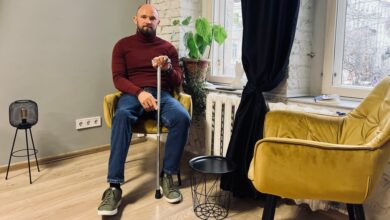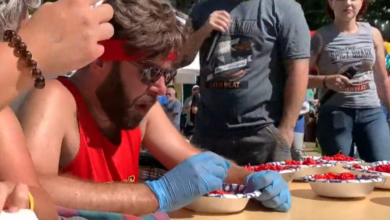Are people meaner, more impatient since COVID-19?

During the pandemic, life was not all sunshine and rainbows. COVID-19 exacerbated several issues plaguing Canada and the world, experts said.
According to Dalhousie University assistant sociology professor Michael Halpin, society went through “the worst event of this lifetime,” and people were essentially told to go back to normal as soon as lockdowns lifted.
But not only did the pandemic worsen deep-seated issues such as mental health, homelessness, health care and political polarization, it has made people think differently about one another, Halpin told CTVNews.ca in an interview.
This can manifest as an impatient customer, less friendly public interactions and selfish behaviour.
Charles Adeyanju, a sociology and anthropology professor at the University of P.E.I., said people are experiencing a “commonality of anxiety.”
“It takes many people to have that problem—or that experience—for them to begin to move for change,” he told CTVNews.ca in an interview last week.
WHY ARE PEOPLE MORE DISRESPECTFUL?
It is undeniably true that the world has changed since the pandemic, Adeyanju said, but how people view the post-lockdown era is up to them.
“Those people who believe that society has been more unkind, it depends on how they are looking at things from their experiences and perspective,” he said.
Adeyanju said the years before 2020 were seen as more “stable” because of how much unrest and uncertainty COVID-19 created.
Halpin, meanwhile, said people view the two time periods with “stark division.”
“I have this idea of pre-COVID as being more tranquil than it actually was, but it was also a mess,” he said. “In some ways, COVID may have been the gasoline but I think for a lot of the problems that we have, it wasn’t necessarily the fire.”
Political unrest and polarization were high prior to the pandemic, Halpin said, referring to 2016 when Donald Trump was elected president of the United States.
“The way that Trump was impacting Canadian society, talking about eliminating NAFTA…We were getting into general insecurity that we had with that flux in our big neighbour to the south.”
Around the same time, BREXIT was also happening, causing economic unrest around much of the world. Halpin added election interference and a spike in disinformation and misinformation on social media all came to a head as COVID-19 spread.
“A lot of those topics or debates or issues as being things that kind of bubbled up post-COVID,” he said. “But the issues that we are paying attention to now, they became perhaps amplified or magnified (during the pandemic.)”
When public health recommendations for everyone to stay home were announced, most people were upset because of how different society looked, according to Halpin. People worked from home, missed weddings and holidays and couldn’t hug their loved ones.
Masking was mandatory in all public settings and the government implored people to follow the rules.
“We got used to policing people’s actions during COVID, we got used to policing whether people were following the procedures, whether they were violating quarantine, if they’re wearing their mask,” Halpin said. “We’ve been kind of taught to monitor other people’s behaviour in a different way.”
Because of how COVID-19 spread through communities, public health messaging focused on everyone doing their part to protect each other. So when a person breaks a rule, Halpin said, people realize how that can impact them personally.
“When you start seeing people as ‘others,’ you make less affordances for how they might be behaving,” he said. “We see it as emblematic of a larger social issue.”
Another factor that could be playing into this societal unrest is the lack of acknowledgment of how hard the pandemic was on people, Halpin said.
“We never really talked about it being difficult and we didn’t really make it easy for ourselves either,” he said.
Expectations that children kept up with school and people performed well at their jobs was a “big disruption.”
“I think in many ways, we don’t take it as seriously as we should. And we haven’t really had the conversations about how it impacted all of us in a way that perhaps we should be having,” Halpin said.
HOW DO CANADIANS FEEL ABOUT IT?
CTVNews.ca asked readers if they felt general unkindness from strangers and had unpleasant experiences since the pandemic lockdowns. Several people reached out via email to share how they feel a difference in the way people treat one another compared to before COVID-19.
CTVNews.ca has not independently verified all emailed responses.
————–
Across Canada, lockdown orders were lifted at the discretion of individual provinces and territories.
Some places experienced longer periods without public health restrictions while others bounced between sometimes confusing policies for up to two years since the onset of the virus.
Despite some feeling excited to get back to the way things were, people quickly realized the society they returned to was very different than the one they knew before the pandemic.
“For some reason I find people in general to be more needy, pushy and demanding than before COVID,” Dan Bachman, of Saskatoon, told CTVNews.ca in an email. “General politeness and courtesy seem to be a thing of the past, we have certainly become a ‘me first’ society.”
Others, like Gail Goldstein from Montreal, told CTVNews.ca she finds instances of road rage and people behaving impatiently to be more common.
“The pandemic has surely changed people!” Goldstein wrote in an email.
It’s not just in public spaces that there appears to be a sense of anger, Janet Wees told CTVNews.ca in an interview, the online world has also become more “hateful.”
“Online they have the freedom to be anonymous,” Wees, who lives in Calgary, said. “I think social media has a big influence on some people…(Before COVID) you had freedom of speech, nobody really attacked you, but now it just seems like you’re attacked. And it’s every person for themselves.”
Wees said people concerned with their freedoms are fighting for their rights over everyone else’s.
“When people started spouting that ‘I have a right to refuse to wear a mask,’ some of us would counter with ‘What about our rights? We have a right to be healthy. You need to stay away from us,'” Wees said. “To me, it was a very selfish attitude.”
Kate Faith, a former teacher, believes fear makes people behave poorly. She told CTVNews.ca in an email that she did not want to get the COVID-19 vaccine and was fired from her job.
“I had people tell me they hoped I get COVID and die because I’m not jabbed,” Faith said. “I’ve been called ignorant, racist and stupid — all because I didn’t feel comfortable taking [the] jab.”
Melanie Schwabe from Shelburne, Ont. says she felt as though public health regulations such as mask and vaccine mandates divided people further.
“I am an Ontario nurse who lost her career to vaccine mandates,” Schwabe told CTVNews.ca in an email.
She said she was “vilified and shamed,” “blamed for prolonging the pandemic,” and accused of being “selfish and uneducated.”
Tracy Ford, from Victoria, B.C., said she believes fear makes people behave poorly.
“I think the pandemic put people in a state of fear which destroyed their thinking and especially their empathic or altruistic capabilities,” Ford wrote in an email to CTVNews.ca “It really seems like everyone today is just out to save themselves; and if they hurt someone else in the process, who cares.”
Devin Hogg, from Guelph, Ont., said that the “niceness” and “politeness” of Canadian society before COVID was “performative.”
“Due to being on the autism spectrum, I had to pay very close attention to social behaviours,” he told CTVNews.ca in an email, adding the “pandemic began the process of stripping this lip service to politeness away.”
“I believe the veneer of politeness and nicety has remained stripped away even with the pandemic seemingly fading in certain privileged populations because the illusion of safety and entitlement has been shattered,” he said. “Regardless of the reaction, there is a recognition on some level that we cannot go backwards.”
WHERE ARE WE GOING?
Despite the pandemic highlighting so many negative aspects, Adeyanju said there is still kindness to be found.
“People have actually come together to welcome new immigrants (for example); working with one another to help,” he said. “I think it has also brought some people together, in a way to fight a common cause.”
Adeyanju hopes things will get better but said it’s up to people to realize the issues and fix them together.
“But out of crisis could emerge new things. It is an opportunity to fix some of the problems that have been there before COVID,” he said.




